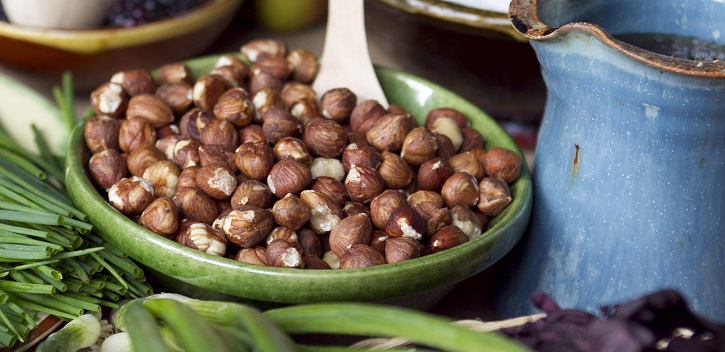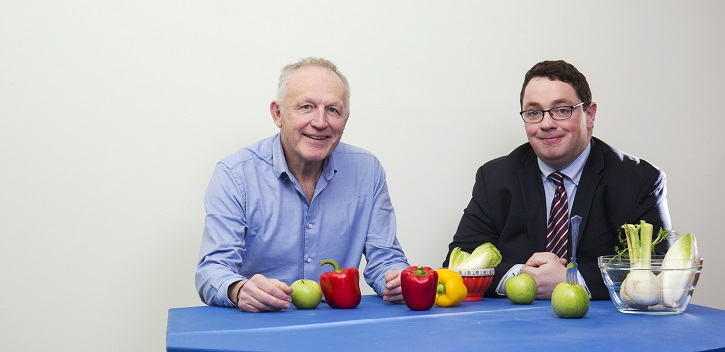Long Read: Love your gut...

By Graham Clifford.
A waft of something fishy tickles my nostrils as the automatic doors go their separate ways.
It could be salmon…or the calamari?
I’ve stepped into the foyer of the Cork International Hotel and it’s dinner time. “Has the Chef read the book?” I wonder.
I’m here to meet two men whose names have been propelled into the spotlight on both sides of the Atlantic, and beyond, following the release of their book The Psychobiotic Revolution.
Focusing on how bacteria in the gut, or microbiota, can play a key role in regulating brain functions, particularly emotional processing and behaviour, it has the potential to change the way various diseases are treated adding further credence to the Hippocrates instruction ‘Let food be thy medicine’.
Diversity in microbiota may be crucial in the fight against depression and a range of other conditions.
Professor John Cryan, Chair of the Department of Anatomy and Neuroscience at the University College Cork and Ted Dinan, a Professor of Psychiatry at the University who also works as a Psychiatrist, were already well-known in the world of microbiology but these pages have brought them to the attention of the inquisitive layman and woman too. Pardon the pun but the book is ‘digestible’ – even for those with limited knowledge of this field.
With the assistance of Ohio-based author Scott C. Anderson the two scientists have managed to capture the world’s attention. They’ve reshaped that which was presumed for generations.
The book, published by the National Geographic, has received rave reviews not just in medical publications such as The Lancet – but also with readers on Amazon. Its appeal has spanned a vast spectrum and it's already being reprinted in the States.
It's been a long but thoroughly rewarding day for the duo. As the APC Microbiome Ireland symposium draws to a close, the two men take a seat for yet another interview. Since news of their discoveries emerged, even before the book hit the shelves in the US, they’ve been in high demand.
Annually the two men speak at around 20 events across the Atlantic and they estimate they have to turn down around 70 percent of the invitations that come their way due to work commitments. Eastern travel is required too. John is off to Dubai shortly to speak at a world conference on ‘Happiness’.
Ted takes his seat throwing his shoulders back and relaxing into the chair in his casual jacket. In contrast, John sits straight with elbows on the table focussing forward. He’s suited and booted. They are far from an odd couple – more a complementary partnership who know each other so well having worked together at the APC Microbiome Institute at UCC for 14-years. They have shared so many research hours and discoveries that it's little surprise they often finish each other’s sentences.
“Well I suppose we reached a critical mass of papers where the field has gone from healthy scepticism to a general acceptance that maybe these guys in Cork are onto something,” explains John Cryan.
He continues: “That took a while because we’re talking about a paradigm shift in relation to how we conceptualise how our brains work. In medicine we tend to compartmentalise systems in the body so if you’re interested in what happens in neuroscience or psychiatry you’re interested in what happens from the neck up but what we were talking about was very different.”
In drawing such an obvious link between the food we eat and how our brains function this research impacts every person on the globe. And may enable those who read The Psychobiotic Revolution to do something about their diet and therefore their mood.
“It can have a major impact on medicine too of course. Like the number of lectures on nutrition that medical students get is negligible yet it’s so important in terms of preventative medicine and treatment,” says John Cryan.
And Ted Dinan tells me: “For so long it's generally been perceived that anti-depressants and cognitive behavioural therapy are the mainstays of treating depression but the work that John and I have done clearly shows that your microbiota is very important and that for the more holistic management of depressive illness we should be focusing on diet and exercise as well. There’s an increasing amount of evidence that taking a Mediterranean diet is protective against depression for example. If you combine a Mediterranean diet with anti-depressants then you’ll get a better outcome. In essence, the Mediterranean diet promotes diversity of good bacteria.”
So what foods should we be taking to help improve our mood? Oily fish frequently comes top of the list as well as certain vegetables – especially those containing high levels of fibre such as split peas, lentils, black beans, artichokes, peas, broccoli, and brussel sprouts.
I ask the two professors if, by virtue of the fact they’ve spent their careers better understanding the positive benefits of a good diet, they have changed their lifestyles as a result.
“My wife has taken to making Kefir now. It’s a fermented milk drink from Russia and is rich in probiotics but if I’m being honest I don’t really like the taste of it, it’s very sour!” explains John knowing that he’ll be in trouble if his other half reads this.
But he adds: “In general though I’m much more aware of what I eat and the issues around things like preservatives. Also, you can’t have enough fibre.”
Beside him, Ted tells me: “I’ve always eaten a lot of fresh fish, two to three times a week. Like John, I’m definitely trying to increase my fibre intake. Recently I’ve started to eat a lot more nuts. I try to eat as diverse a range of fruit and vegetables as I can. But when I’m travelling my diet goes off the rails.”

The two men explain how the diversity of diets in the western world have changed so much over the years, and indeed, how the microbiota of people here in Ireland has narrowed in its diversity due to a greater consumption of processed foods, more stressful lives, a lack of exercise, and less contact with animals.
“If you go back to the Sixties most people in Ireland would have had a high level of Lactobacillus reuteri in their microbiome – now that’s almost extinct,” explains Ted Dinan.
And John Cryan explains: “If you go to rural Tanzania and look at the microbiome of hunter-gatherers there you’ll find that it's really diverse. The introduction of modern agricultural methods in places like Malawi and parts of Venezuela have, we know, led to a reduction in the diversity of microbiome. Still, though both areas have an absence of some of the modern diseases of inflammation such as multiple sclerosis, chromes disease, type one diabetes, obesity and so on. Other factors influence their health of course but for us researching the link between the gut and the brain this is fascinating.”
And Ted Dinan and John Cryan are not just looking at the correlation between food and how our brain works but the causation also. Because of that, and the breakthroughs they’ve made, it's little wonder that major food producers and some pharmaceutical companies have been seeking the advice and guidance of the two Cork-based scientists.
It’s a hugely exciting prospect for the two men that their work could help change the way mental health issues, in particular, are treated.
“One could envisage a situation, maybe in a decade or less, where somebody who is depressed would have their microbiota sequenced and by looking at the results we could say there are certain strains missing. Then we could give a personalised medicine, psychobiotics, that would help restore normality to your microbiota as treatment for that depression,” says Ted Dinan.
And the duo, ever researching, thinking, testing and innovating at their germ-free lab at UCC say their collaborative team of researchers is somewhat unique.
Professor Dinan tells me: “There are at least half a dozen large research groups internationally in this field. But what truly distinguishes us from the others is that ours is a translational research group. Like John and I do work in humans, we do work in mice and rats, we span the spectrum.”
And John Cryan adds: “Because of the APC here in Cork we sit around a table every Friday with gastroenterologists, microbiologists, nutritionists and a range of other academic leads, it’s a wide collection of like-minded driven people that are multi-disciplined. We’re not just an umbrella group of disparate projects.”
And in praising the input of Science Foundation Ireland Ted tells me: “They’ve been very good to us. Through them we’ve had interaction with companies which have brought tools and information to our research which has been very fruitful. Industry collaboration can be a very good thing in progressing research.”
So what next for these two pioneers of microbiome?
Plans to explore further how a C-section impacts the bacterial diversity of a baby’s make up are at an advanced stage and the two men are talking with companies who make formula for infants about ways of replacing those vital natural sugars only found in breast milk. They’re also looking at the correlation between diet and aging.
They continue to examine the causes of stress and the now clear link with the gut.
And before we part, Ted Dinan tells me of another hugely exciting idea which could well come to fruition.
“Just last year an Australian study was the first to use the Mediterranean diet in a controlled way to show it has anti-depressant effects. John and I are on the verge of submitting an application for European Horizon 2020 funding to look at the components of the Mediterranean diet namely the polyunsaturated fatty acids, prebiotics and polyvinyl found in red wine. Our plan is to then take those three components to carry out a placebo-controlled trial in a large cohort of depressed patients to see if giving them in a capsule can produce the same result as putting somebody on a Mediterranean diet.”
Such innovation strikes me as being quite brilliant – especially on a dark winter’s evening when the wind and rain lash the southern Irish coast. In the Med we are not.
Clearly the time for basking in the success of The Psychobiotic Revolution will be short-lived by Ted and John. Their research comes first and with their area of expertise being so hot right now in the world of biomedicine they must squeeze every last drop out of this incredible, and thoroughly deserving, opportunity.
For further information about the SFI Research Centre, APC Microbiome Ireland visit here.
Media - for further information contact:
Dr Catherine Buckley, Communications & Outreach Manager, APC Microbiome Ireland, University College Cork , tel +353 214903362; Mob +353 86 8554744; Email: c.buckley@ucc.ie or
Ruth Mc Donnell, Head of Media and PR, Office of Marketing and Communications, University College Cork, Tel: +353 21 490 2758 Mob +353 86 0468950 E-Mail: r.mcdonnell@ucc.ie
